Charting the Path Forward



04 CHARTING THE PATH FORWARD COMMENT
11 SOMBOLED
President Somborska – Pleasure is important
06 DRAGAN STOKIĆ
President CCIFS Proactively Shaping the Business Environment
10 ALEKSANDAR VLAJKOVIĆ
Owner ASE Consultingess Association of Serbia (HBA) A Team for Every Challenge
general director of CCIFS; secretary general of CEBAC The Business Community as a Driver of Change
14 A CENTURY SINCE THE BIRTH OF JACQUES DELORS A Pro-European Visionary


The longstanding partnership between France and Serbia continues to evolve, rooted in mutual respect, shared values, and a forward-looking vision. In this edition of CorD, we explore the political, economic, and cultural dimensions of this relationship, as well as the opportunities and challenges that lie ahead
While the foundations of Franco-Serbian cooperation remain solid – as evidenced by numerous French investments, cultural programmes, and institutional collaborations –there is also a growing awareness that the region stands at a critical juncture. As France’s Special Envoy for the Western Balkans, René Troccaz, reminds us in his text, peace and stability cannot be taken for granted. More than two decades after the end of the conflicts in the former Yugoslavia, the need for reconciliation, political dialogue and a lasting resolution between Belgrade and Pristina remains urgent.
Troccaz also notes that further progress in the rule of law, freedom of the press and judicial reform are key to creating the kind of political environment in which meaningful cooperation and investment can thrive. This is not merely a checklist for EU integration, but a broader societal imperative. France, he writes, will continue to support Serbia in advancing these reforms, but responsibility ultimately rests with local leadership and institutions. This issue also features insights from key business figures. Sanja Ivanić, CEO of the French-Serbian Chamber of Commerce, speaks of “a mature and diversified partnership,” pointing to successful cooperation across sectors such as energy, construction, and banking. Dragan Stokić, President of the Chamber’s Board, underscores the importance of predictability and transparency

for long-term economic engagement. Both stress the importance of continuity and strategic dialogue between the business community and the state.
As Serbia continues its path of transformation, the presence of French companies, from historical investors to new entrants, remains a powerful symbol of trust and ambition. At the same time, the prospect of renewed diplomatic leadership in Belgrade – with the expected arrival of a new French ambassador –brings an opportunity to revitalise bilateral dialogue and deepen cooperation in key areas, including green transition, digital innovation and regional security.
As Serbia continues its path of transformation, the presence of French companies, from historical investors to new entrants, remains a powerful symbol of trust and ambition
We extend our sincere gratitude to our partners – Lesaffre, Belgrade Airport, ASE Consulting and Somboled – for supporting this edition. Their commitment is a testament to the strength and vitality of the French-Serbian partnership, and a reminder that progress is best achieved when institutions, businesses and civil society work in concert.
French companies have a long-term and stable presence in Serbia, with investments that are not just capital-intensive but also contribute to the transfer of knowledge, technology, and business culture. Their contribution is multifaceted — from modernising infrastructure, enhancing the energy sector, to strengthening the food industry and logistics. – Dragan Stokić

Dragan Stokić, President of CCIFS, in an exclusive interview for CorD, highlights that Serbia has significant potential for development in sectors requiring high added value and innovation, and that the role of French companies is particularly important. He also adds that the key areas for further cooperation improvement are digital transformation, sustainable mobility, green energy, and education.
During the General Assembly of CCIFS, plans were presented for strengthening the network of members and enhancing the business community. What specific initiatives do you plan to further strengthen mutual cooperation and the position of French companies in the Serbian market?
— Our focus is on connecting members through thematic clubs and sectoral working groups, as well as enhancing the visibility and influence of the community through cooperation with domestic institutions. We plan a series of workshops, B2B events, conferences, and a regional forum. In addition, through partnerships with local and international associations, our goal is for French companies to be proactive in shaping the business environment and be recognised as leaders in sustainable and responsible business practices. In this regard, we are proud to have been one of the initiators of the Council of European Business Associations and Chambers of Commerce (CEBAC) and its first secretary.
The new Government of Serbia has been formed during a time of challenges but also opportunities for improving the economic climate. What are your expectations regarding the cooperation between CCIFS and the French business community with the new cabinet, and which reforms would you prioritise?
— We expect open dialogue and continuity in reforms that contribute to a predictable and transparent business environment. We see reforms in the judiciary, administrative simplification, public administration digitalisation, and improvement of the education system in line with labour market needs as priorities. CCIFS is ready to, as a bridge between institutions and the business community, provide constructive proposals and support in defining and implementing reform measures.
French companies play a significant role in the construction of the Belgrade metro, but the project faces certain challenges. How would you assess the progress so far, and how can CCIFS contribute to overcoming existing obstacles?
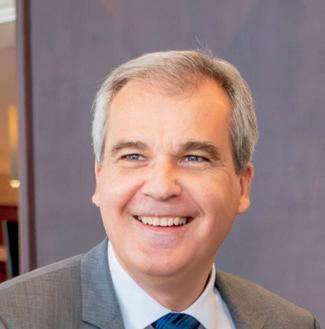
Our focus is on connecting members through thematic clubs and sectoral working groups, as well as enhancing the visibility and influence of the community through cooperation with domestic institutions
We expect open dialogue and continuity in reforms that contribute to a predictable and transparent business environment
By connecting with already present firms, facilitating the exchange of experiences, and assisting in navigating local procedures, CCIFS can help overcome obstacles and accelerate the project’s realisation
— French companies, such as RATP Dev, Alstom, and Egis Rail, are key partners in the development of the Belgrade metro. Their participation brings essential international experience in managing complex infrastructure projects, from technical recommendations to planning operations and cost optimisation. RATP Dev, for example, has been actively involved as an advisor in the early stages of the project for two years, which further confirms the trust of domestic institutions. However, the project faces challenges, particularly regarding administrative procedures, coordination among multiple international partners, and environmental issues. In this context, CCIFS (the French-Serbian Chamber of Commerce) can play an important role as a bridge between French companies and the local environment. By connecting with already present firms, facilitating the exchange of experiences, and assisting in navigating local procedures, CCIFS can help overcome obstacles and accelerate the project’s realisation.
The establishment of the Council of European Business Associations and Chambers of Commerce (CEBAC) in Serbia represents an important step towards strengthening the joint presence of the European business commu-
Through partnerships with local and international associations, our goal is for French companies to be proactive in shaping the business environment and recognised as leaders in sustainable and responsible business practices
nity. How do you see the role of CCIFS within CEBAC and what benefits do you expect for your members?
— CCIFS’s role within CEBAC is very active — as one of the founders and its first secretary, we are dedicated to improving coordination and jointly representing the interests of the European business community. We are proud that we used the first year to launch a large number of projects: initiating the work of sectoral committees, organising several events with over 200 companies attending each time, starting a dialogue with various ministries, and becoming the main inter-
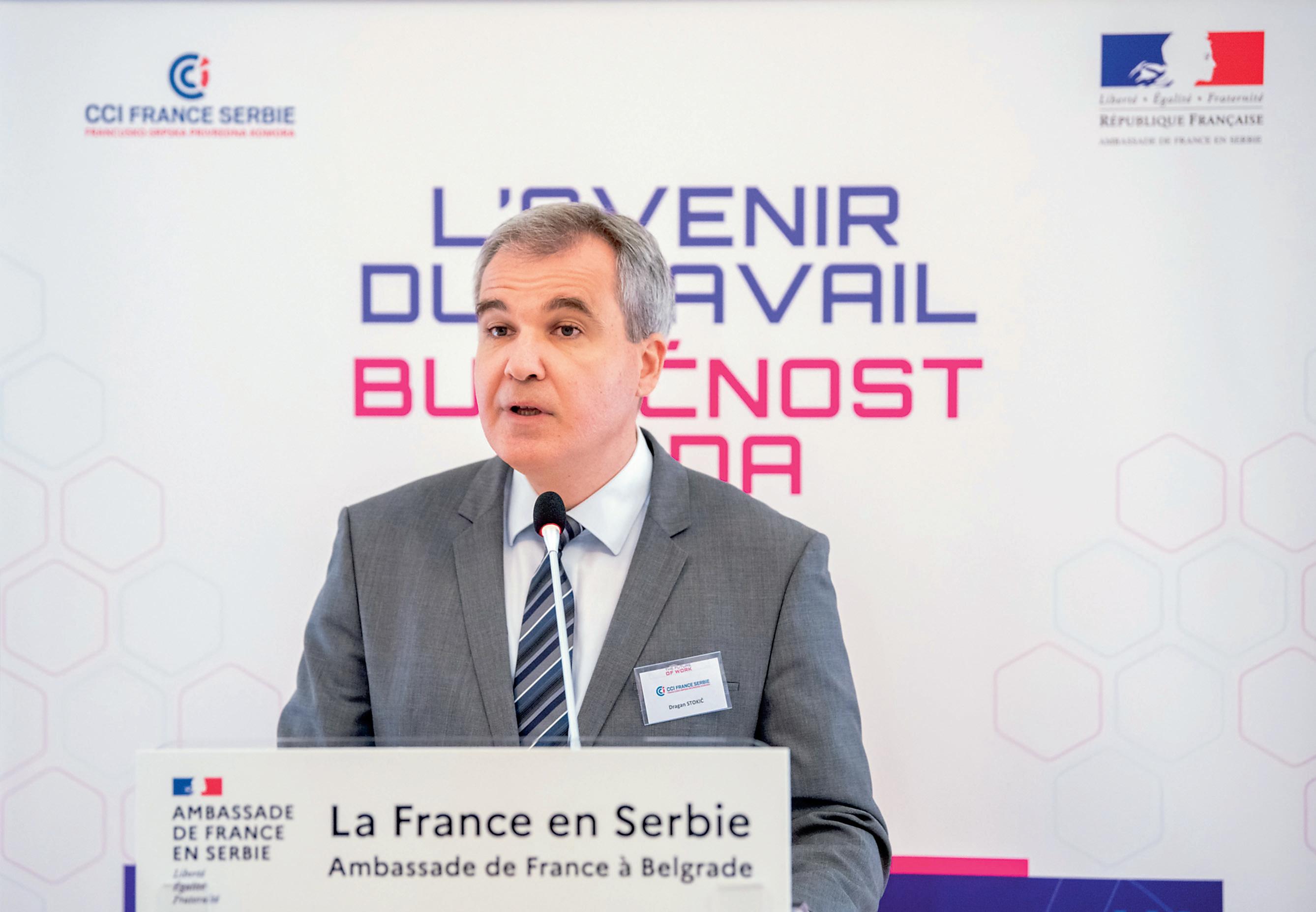
locutor for the EU Delegation in Serbia, as well as the European Commission. CEBAC provides a strong unified voice for European companies in dialogue with authorities and international institutions. Our members will benefit from better information, joint initiatives, networking opportunities, and the chance for their voices to be heard through this unique platform.
EXPO 2027 is a great opportunity to promote French innovation, culture, and entrepreneurship. Our goal is to showcase the best that the French economyoffers — from sustainable solutions in urban planning to creative industries
France’s participation in EXPO 2027 in Belgrade has been confirmed by President Macron. What activities does CCIFS plan for this event to further promote the French economy and culture in Serbia?
— EXPO 2027 is a great opportunity to promote French innovation, culture, and entrepreneur-
ship. CCIFS will organise a series of events before and during the exhibition, including thematic forums, business delegations, and cultural-business meetings. Our goal is to showcase the best that the French economy offers — from sustainable solutions in urban planning to creative industries. We also see EXPO as an opportunity to strengthen Franco-Serbian partnerships and enhance bilateral cooperation in areas of mutual interest.
Sustainable development and ESG principles are becoming increasingly important factors for the success of companies in the global market. How does CCIFS support its members in implementing ESG standards, and what areas do you see as key for further development? — CCIFS recognises ESG as a key component of modern business. We organise training sessions, workshops, and panels on these topics in collaboration with experts and members who are leaders in ESG practices. Special focus is placed on decarbonisation, circular economy, inclusive employment, and ethical governance. Additionally, we work on connecting members with relevant financial and regulatory actors to facilitate alignment with increasingly demanding sustainability standards.
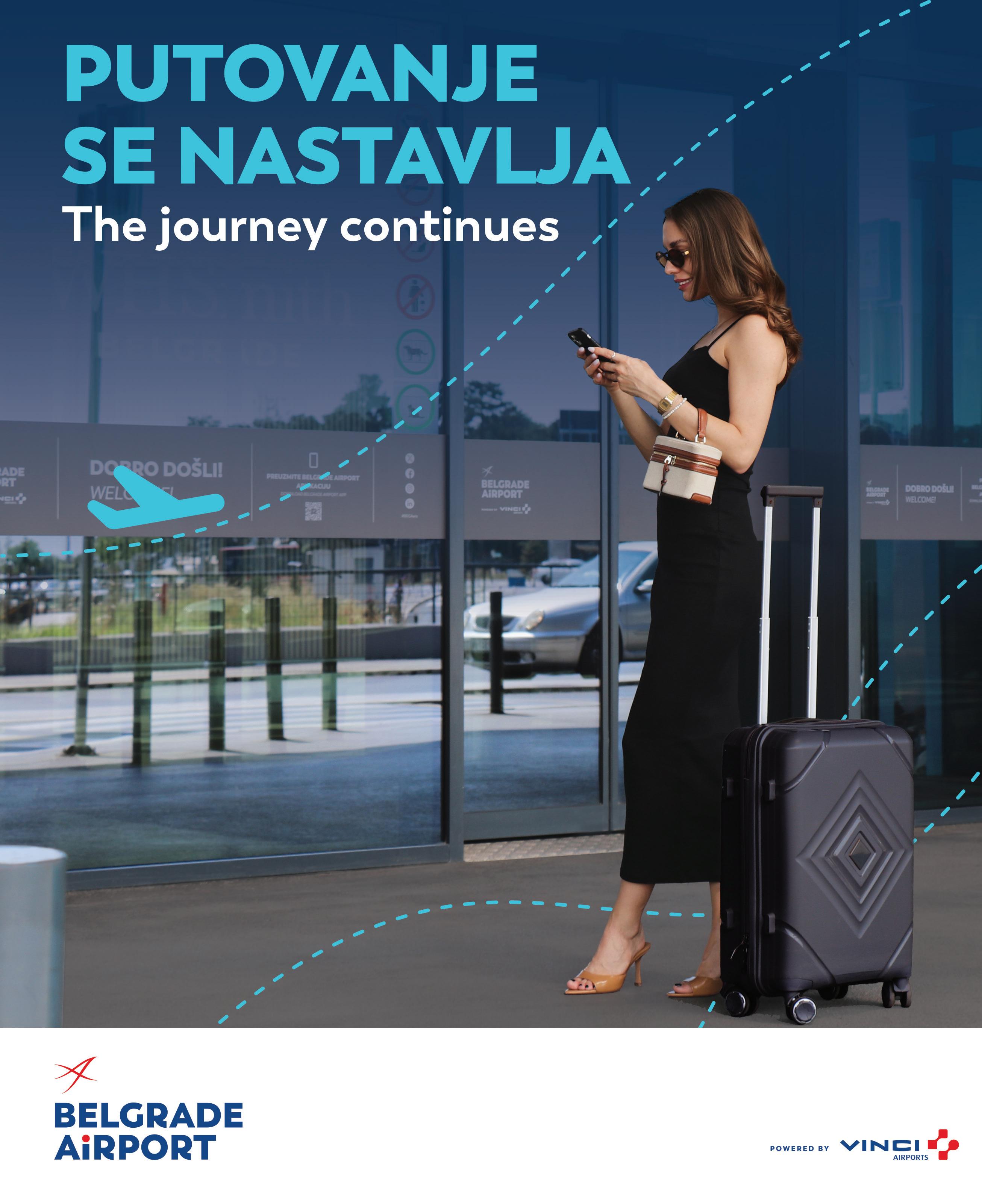
ASE Consulting, a member of the Association of Consulting Engineers of Serbia and the French-Serbian Chamber of Commerce, has built a successful reputation in providing expert supervision at all stages of construction, as well as in project management

Every successfully implemented project provides us with experience and the additional strength needed to take on new challenges in complex construction — says Aleksandar Vlajković, with whom we spoke about the challenges of the construction sector, the projects his company is currently engaged in, investor expectations...
Your company specialises in expert supervision and the management of complex construction projects. What exactly do your services include?
— ASE Consulting primarily provides expert supervision services across all stages of construction, from excavation pit protection and structural works to the installation of systems and the execution of architectural and finishing works. In addition to supervision, we offer project finance monitoring services for clients who require reports for the banks. We are also able to provide consultancy for the design and construction management of complex facilities.
You are currently engaged in numerous projects, from the construction of mixed-use buildings and hotels to industrial facilities and a water park?
— There is currently a great deal of construction underway in Serbia, creating opportunities for both existing and new consulting firms to become involved. My company is currently engaged in several projects, among which I would highlight the expert supervision of the new “Panonka” development in Novi Sad,
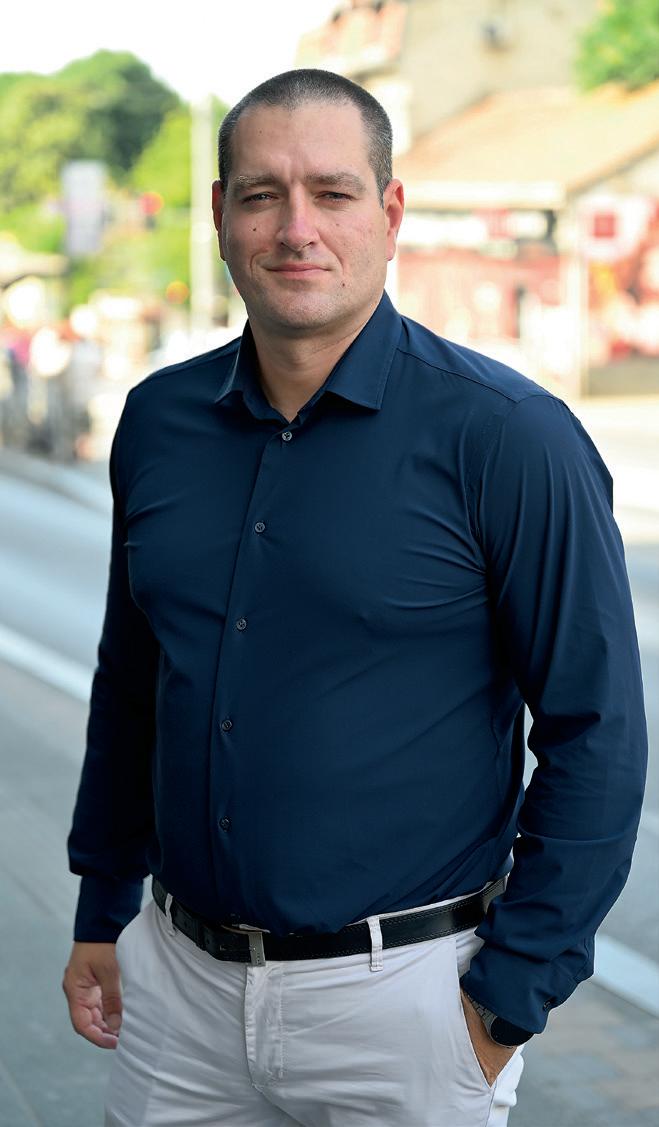
your visibility and networking with successful professionals?
— Both memberships have given me the opportunity to exchange valuable business ideas, participate in important seminars both in Serbia and abroad, meet successful professionals and identify potential new business opportunities.
You have a team that, thanks to its knowledge, experience and dedication, can rise to every challenge encountered during the course of a project?
— We are engaged in an extremely responsible line of work, where even the smallest oversight or error in monitoring and quality control on construction sites is unacceptable. The role of expert supervision on any project is a serious undertaking. A well-executed supervision process during construction provides the investor with assurance and confidence that the project will be completed successfully and on time. Effective supervision in-
A well-executed supervision process during construction provides the investor with assurance and confidence that the project will be completed successfully and on time
commissioned by the investment company Zoned Group. This project involves the construction of a new residential and commercial neighbourhood comprising 14 buildings, ranging from eight to 14 storeys, with a total residential area of 85,000 square metres.
ASE Consulting is a member of the Association of Consulting Engineers of Serbia and, more recently, the French-Serbian Chamber of Commerce. This says a great deal about
cludes not only daily and weekly reports from regular site visits, but also the organisation of regular meetings with contractors, designers and other consultants, in order to successfully coordinate activities, meet monthly and final deadlines, swiftly address issues arising during the works, and manage all other crucial factors that affect the successful realisation of the project. Every successfully completed project enhances our expertise and provides the strength needed to take on the next challenge in complex construction.
President, the most prominent brand of the French group Lactalis, continues to strengthen its position on the Serbian market year after year. Thanks to the joint efforts of colleagues from France, Serbia, and other countries where Lactalis operates, excellent results have been achieved locally.
One of the ways to increase sales and market share lies in continuous innovation and further investment in existing products. This year, Somboled, a member of the Lactalis Group, is celebrating a significant milestone – 40 years of President Somborska on the Serbian mar-
ket. To mark the occasion, a special anniversary packaging design for 2025 has been unveiled, and a new campaign for this product is currently in preparation.
To recall, President Somborska is a full-fat white cheese, known for its rich flavour and creamy texture, produced for four decades according to the original recipe of the Sombor dairy. Made from premium-quality cow’s milk sourced from the pastures of Vojvodina, it retains its freshness thanks to high-quality packaging –available in 250g, 500g and 900g tubs.
President Somborska is an ideal ingredient for preparing a variety of salads
and, when combined with tomatoes, peppers, onions, lettuce, rocket, herbs and olive oil, allows for a delicious meal to be made with ease. It also pairs excellently with fine meat delicacies and makes a perfect addition to quick appetisers. Moreover, it can be served as a refreshing side dish with grilled specialities. It can also be used for making sandwiches, canapés and bruschetta, or as a key ingredient in the preparation of traditional pies and gibanica, giving them a distinctive flavour. However you choose to enjoy President Somborska, one thing is certain – you will enjoy it, and pleasure is important.

The business community must actively engage in the European integration process as it can be the key driver of change through the adoption of European standards and practices. As CCIFS, and through the platform of the Council of European Business Associations and Chambers (CEBAC), we will intensify our cooperation with EU institutions and national bodies in the coming period to provide our members with up-to-date information, training, and support to align with European regulations – Sanja Ivanić
In this interview with Sanja Ivanić, Executive Director of the French Chamber of Commerce and Industry in Serbia (CCIFS), we learn more about the chamber’s current role in Serbia’s EU integration, the organisation of significant events, and the services CCIFS offers to French companies. Ivanić also provides an in-depth explanation of preparations for EXPO 2027, which she sees as a major opportunity for the promotion of French innovations in the regional market.
You recently met with European Commissioner for Enlargement, Marta Kos, to discuss Serbia’s European perspective. What were the key conclusions of that meeting and how does CCIFS plan to support its members in the context of the current integration processes?
— The meeting with Commissioner Marta Kos was very constructive and confirmed that Serbia’s European perspective remains firmly on the EU agenda. It was stated that there is currently momentum regarding the accession process and that
The goal of CEBAC is to contribute to creating a more competitive, stable, and predictable business environment for all companies operating in Serbia – whether they are international or domestic. For CCIFS members, this means even stronger support

Serbia must seize this opportunity and accelerate reforms. The key conclusion is that the business community must actively engage in the European integration process, as it can be a driver of change through the adoption of European standards and practices. As CCIFS, and through the platform of the Council of European Chambers of Commerce and Associations in Serbia (CEBAC), we will intensify our cooperation with EU institutions and national bodies in the coming period to provide our members with up-to-date information, training, and support to align with European regulations. We will also work on increasing the visibility of successful examples of cooperation between French and Serbian companies that already operate in line with European principles.
In 2024, CCIFS organised several significant events, including the France-Western Balkans Forum and the traditional French Week. Which activities would you highlight as most important for promoting French-Serbian cooperation and what new initiatives can we expect in 2025? — I would single out the France-Western Balkans Forum as the most strategically important event, as it brought together companies, institutions, and partners from across the region with the aim of strengthening regional connectivity and positioning France as a reliable investor. On the other hand, French Week has a strong cultural and promotional character, further enhancing mutual understanding and trust between France and Serbia. In 2025, we will organise the second edition of the France-Western Balkans Forum, focused on the theme “Adapting to Change: Building Business Resilience”, while in November we will host a new edition of French Week, including traditional events such as Beaujolais Nouveau, and plan to organise a conference on nuclear energy.
As the General Secretary of the newly established CEBAC, you are actively involved in strengthening the European business community in Serbia. What are the main initiatives launched within CEBAC and what contribution do you expect for CCIFS members?
— The 14 chambers and business organisations that make up CEBAC represent over 2,000 companies with European capital, employing more than 120,000 people. When it comes to foreign trade, European countries are Serbia’s most significant partners, both for exports and imports. In this sense, CEBAC is today the most important economic factor in Serbia.
CEBAC is a project I have personally championed since 2014, and I am very pleased that we were finally able to realise it in 2024. Having had the opportu-
nity to be the first General Secretary of the Council and to lay a strong foundation in its first year holds particular professional significance for me.
In just a few months, we have launched the work of sectoral committees, organised several events with over 200 participants each, established a dialogue with key ministries, and become the most important interlocutor for the EU Delegation in Serbia as well as the European Commission.
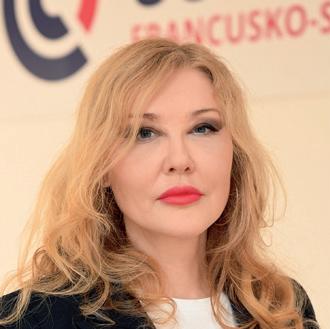
The meeting with Commissioner Marta Kos was very constructive and confirmed that Serbia’s European perspective remains firmly on the EU agenda
CEBAC
The 14 chambers and business organisations that make up CEBAC represent over 2,000 companies with European capital, employing more than 120,000 people
CCIFS
Our team guides companies through every stage of entry – from initial analysis, market testing, to establishment and expansion
The goal of CEBAC is to contribute to creating a more competitive, stable, and predictable business environment for all companies operating in Serbia – whether they are international or domestic. For CCIFS members, this means even stronger support, direct influence on business policies, and more opportunities for connecting with the European business community.
CCIFS provides support to French companies wishing to develop their business in Serbia through a range of specialised services. What are the most in-demand services, and how does the chamber help companies successfully enter and position themselves in the market?
— The most sought-after services are market studies, business partner identification, and support during market entry. Our team guides companies through every stage of entry – from initial analysis, market testing, to establishment and expansion. What sets us apart is our approach, which combines local experience with French standards of quality.
EXPO 2027 in Belgrade offers a unique opportunity for the promotion of French companies and innovations. How does CCIFS plan to support its members in preparing for this event and further strengthen their presence in the regional market?
— EXPO 2027 is a great opportunity not only for Serbia but for the entire region, and we see it as a key event for positioning French companies, especially those engaged in sustainable solutions, urban planning, and digitalisation. CCIFS is already working with relevant institutions on the preparation of the French Pavilion and supporting companies wishing to showcase their offerings through national or sectoral presentations. In addition, we are planning special business missions and thematic conferences to accompany the EXPO activities, with a focus on connecting with partners from the Western Balkans region. Together with other French chambers from around the world, we will also organise visits for their members and business meetings during this period.
“The European idea is based on a triptych: competition that stimulates; cooperation that strengthens; solidarity that unites,” Jacques Delors would often reiterate, expressing his unwavering faith in the original concept of integration –something he once called an “unidentified political object.” Though an old idea dressed in new clothes, the notion of “Europe ’92” succeeded above all thanks to a very concrete programme and its rigorous implementation
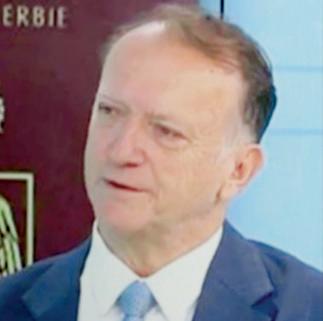
By Duško Lopandić Professor of European Law, President of the Forum for International Relations
Although he was never a president or a prime minister of his own country, Jacques Delors (1925–2023) will be remembered as one of the most significant French political figures of his generation, and a great European whose influence shaped today’s European Union more than perhaps any other politician of his time. He served as President of the European Commission for nearly a decade (1985–1994), a period during which the European Community – previously a primarily economic union of Western Europe – was transformed into the European Union, with ambitions to encompass the entire continent. The only Commission president to serve three terms,
Delors played a pivotal role in formulating and securing key decisions and pioneering policies that led to the creation of the single market, the Schengen Agreement, the Maastricht Treaty (1992), the establishment of the Economic and Monetary Union and the introduction of the euro, as well as the EU’s expansion to Mediterranean and EFTA countries and the opening of membership prospects for Central and Eastern European states.
Nothing at first glance suggested that history was about to take a decisive turn on that day in January 1985, when this former French finance minister, bank official, Christian trade unionist, and life-
long socialist first stepped into the grey corridors of the Berlaymont building –the Brussels seat of the European Commission. His predecessor, the now largely forgotten Luxembourg politician Gaston Thorn, had left the institution in a state of one of its cyclical spells of euro-pessimism, the kind we are familiar with even today. A self-made man and descendant of peasant stock from Corrèze in central France, Delors had built a career in France’s elitist public administration through hard work and an exceptional sense of duty – something he soon brought to the slumbering Brussels bureaucracy. Yet this industrious man, a brilliant organiser with gentle manners and a somewhat reserved demean-
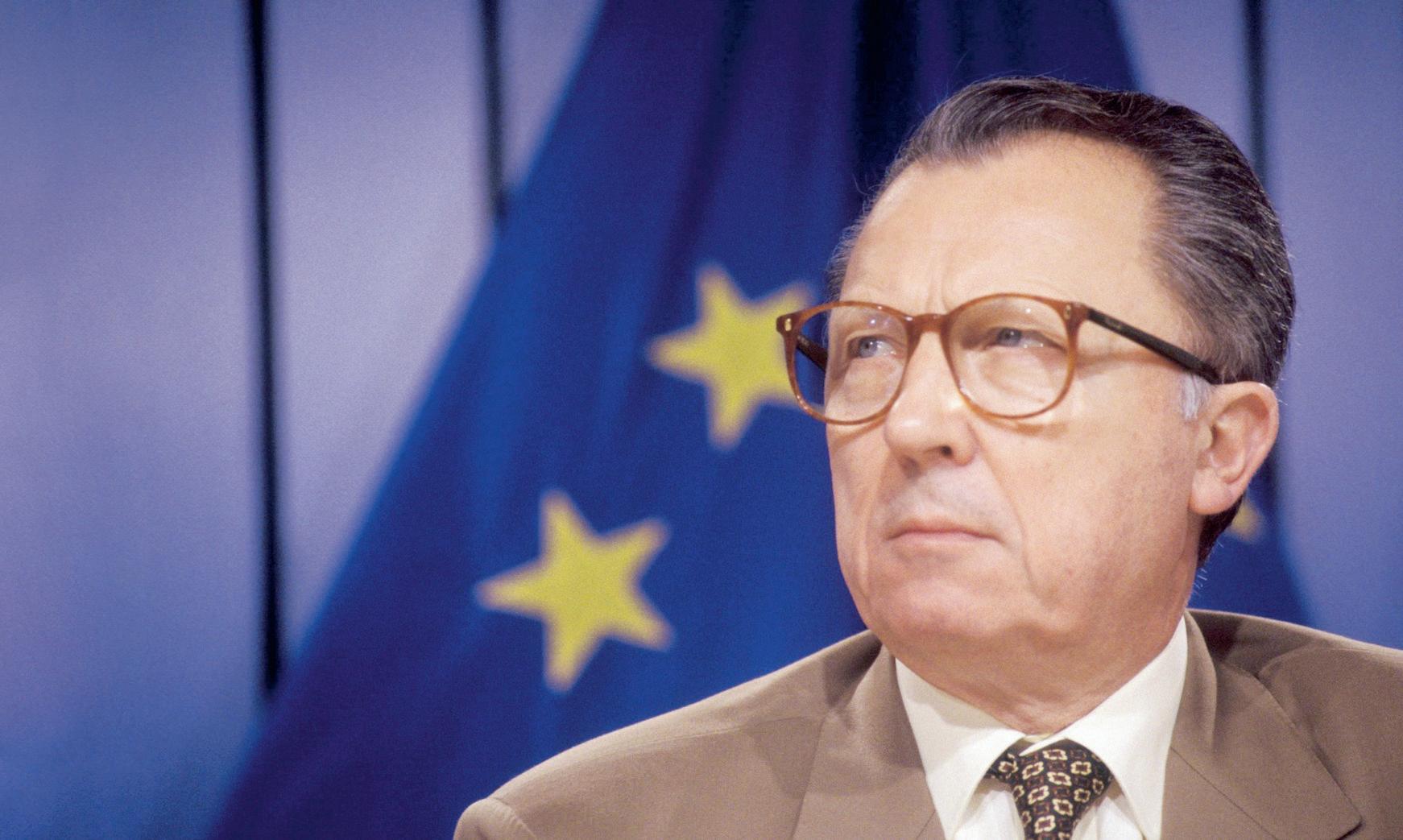
our, was always much more than a successful technocrat. He was a politician of conviction and integrity, a socialist with a deep sense of solidarity and empathy, and a pro-European activist with a clear vision.
Just months after his arrival in Brussels, one of the most effective political and communication campaigns in the EU’s history was launched – “Europe ’92” – echoing the spirit of Jean Monnet and the founding of the European Coal and Steel Community. It was an old idea, but reframed in Delors’ style: a plan comprising over 300 measures aimed at removing border, administrative and other barriers in order to achieve the “four freedoms” of movement and to complete the “internal” (or single) market.
“The European idea is based on a triptych: competition that stimulates; cooperation that strengthens; solidarity that unites,” Delors would often repeat, reaffirming his belief in a form of integration he once dubbed “an unidentified political object.” Though an old idea dressed anew, “Europe ’92” triumphed thanks to a concrete programme and strict implementation.
The plan succeeded beyond expectations and resonated widely across Europe at the time. Even neutral EFTA countries applied for membership. With changes unfolding in Eastern Europe and German reunification, France and Germany – led by Mitterrand and Kohl – proposed the creation of a political union. History was accelerating at a frantic pace.
“It was our greatest failure,” Delors remarked with a note of self-criticism, referring to the “Yugoslav drama” that during his term in Brussels had turned into tragedy. In his Memoirs (2004), co-written with journalist Jean-Louis Arnaud, Delors recounted a visit to Belgrade in May 1991, alongside European Council President Jacques Santer. It was one of the final attempts by Brussels to offer financial aid and the prospect of closer association with the Community in a bid to prevent the complete disintegration of the federation. Delors described meetings with federal officials Ante Marković and Budimir Lončar, as well as individ-
ual and joint discussions with the presidents of the six republics. The republican leaders remained divided.
During a joint meeting, Slobodan Milošević, Delors wrote, symbolically moved his chair to sit on the opposite side of the table from the other five presidents. “We returned from Belgrade with the uneasy feeling that our economic offers would not suffice to prevent serious incidents,” he noted.
Although SFR Yugoslavia had, in the decades before the 1991 catastrophe, led the way among former socialist states in cooperation with the EEC – even concluding an ambitious cooperation and association agreement in 1980 – and was objectively in a position to begin deeper integration earlier than Poland or Hungary, everything collapsed rapidly. Delors further described Germany’s unilateral recognition of Slovenia and Croatia, the failure of the Yugoslavia Conference, and his speech in August 1992, in which he stated that only military intervention could stop the civil war and the continuing bloodshed.
Once the conflict erupted and Yugoslavia began to disintegrate, the EU’s
primary goal became to avoid a negative domino effect across the continent.
“The breakup of Yugoslavia is a tragedy –the collapse of the European Community would be a catastrophe,” Delors summarised the consensus among the Community’s member states at the time.
In December 1991, almost simultaneously with the dramatic events in Eastern and Southeastern Europe, the Maastricht Treaty was signed, establishing the European Union. A new Europe was being born – unified, while former socialist federations were falling apart.
After stepping down as Commission President in 1995 and declining to re-enter French national politics (he turned down
“There is a deliberate, systematic attempt to weaken Europe,” warned the committed European federalist in 2004, ahead of the EU’s protracted polycrisis –words that today appear truly prophetic
euro to the great financial crisis; from the Treaties of Amsterdam and Nice to the failure of the proposed “European Constitution” and the adoption of the Lisbon Treaty; from the “big bang” enlargement to the rise of populism and Brexit.
“If there is no such thing as permanent victory, there is also no eternal defeat,” this wise man would say, perhaps thinking of other lifelong passions of his, such as basketball and cycling.
Though somewhat faded, Delors’ vision remains present – in both the strategy and practice of the European Commission, and in the work of institutions he helped to found, such as the Notre Europe – Jacques Delors Institute, which marked the centenary of his birth with a

calls to run for president), Jacques Delors devoted himself, much like Jean Monnet before him, to supporting European projects and ideals from behind the scenes.
“There is a deliberate, systematic attempt to weaken Europe,” warned the committed European federalist in 2004, on the eve of the EU’s prolonged “polycrisis” – words that today seem strikingly
prophetic. It was the end of the euro-euphoria era.
“Where there is no vision, the people perish,” he liked to quote the old proverb.
Delors continued to observe and comment on the ups and downs of the European project in the opening decades of the 21st century: from the success of the
conference titled “Strengthening the Single Market for a Sustainable and Prosperous Future for Citizens.”
“People do not fall in love with a single market... the European project must also have a soul,” Delors often said, advocating European solidarity, regional development policies, social measures and the fight against growing inequality.